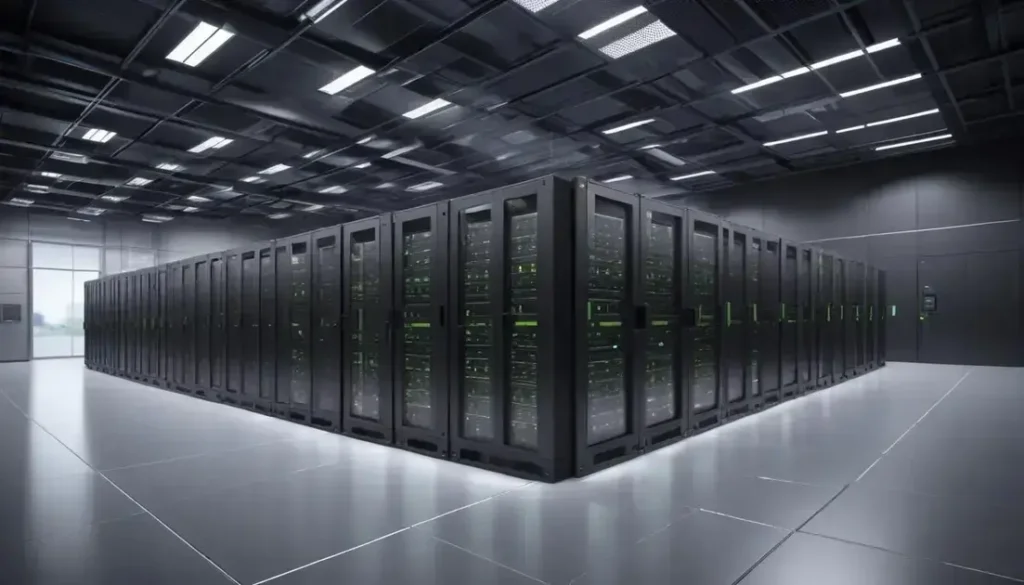Data centres can significantly lower their environmental impact by integrating renewable energy sources, which enhances energy efficiency, reduces carbon emissions, and helps meet growing consumer demand for sustainable practices.
The recent acquisition of a **data centre** power plant by xAI raises critical questions regarding energy sustainability and its impact on Australian businesses. How will this shape future operations?
Overview of xAI’s power plant acquisition
The recent announcement regarding xAI’s acquisition of a power plant has raised significant interest in the energy sector. This strategic move is poised to enhance the operational efficiency of their data centres. By owning a power source, xAI can ensure a more stable and potentially lower cost of energy, which is critical for data processing tasks that require immense computational power.
The Implications for Sustainability: With this acquisition, there is a dual focus on sustainability and innovation. It allows for the exploration of renewable energy sources within the plant, aligning with global ESG goals. The integration of sustainable practices not only supports environmental initiatives but also positions xAI as a leader in responsible energy consumption.
Furthermore, xAI’s investment in energy generation opens new avenues for collaborations with local businesses, particularly those in the tech and energy sectors. This could lead to a more resilient supply chain and create job opportunities, contributing positively to the local economy. As the demand for data processing continues to rise, this acquisition may serve as a model for other tech companies looking to mitigate energy costs while fulfilling their sustainability commitments.
Environmental concerns over data centre energy demands
The growing demand for energy in data centres poses significant environmental challenges. These facilities require vast amounts of electricity to operate efficiently, often relying on non-renewable energy sources. As a result, the carbon footprint of data operations continues to rise, leading to increased scrutiny from environmental advocates and governments alike.
Sustainability Initiatives: In response to these concerns, many data centre operators are exploring options for sustainable energy. This includes utilising renewable energy sources, such as solar and wind, to power their operations. By implementing these measures, data centres can reduce their reliance on fossil fuels and contribute to global efforts in mitigating climate change.
Furthermore, comprehensive energy management systems are essential for optimising consumption. These systems can identify inefficiencies and suggest improvements, ultimately leading to lower energy costs and reduced environmental impact. Companies are increasingly aware that adopting sustainable practices not only addresses regulatory pressures but also enhances their brand reputation and supports long-term business viability.
As scrutiny around energy consumption grows, data centres must adapt to meet both operational needs and environmental responsibilities. This dual focus on energy efficiency and sustainability is crucial to upholding the broader goals of a greener future.
Impact of xAI’s expansion on local businesses
The expansion of xAI into the energy sector through its recent power plant acquisition is set to significantly impact local businesses. With xAI positioned to become a major energy supplier, businesses relying on stable energy sources can expect improved reliability in their operations. This improvement is crucial in industries where power disruption can lead to financial losses.
Opportunities for Collaboration: As xAI increases its footprint, local businesses may find new opportunities for partnership. The integration of advanced AI technologies in energy management can lead to innovative solutions tailored to local needs. This collaboration could enhance operational efficiency and reduce costs across various sectors.
Moreover, xAI’s commitment to energy sustainability can align with the values of local enterprises aiming to improve their ESG credentials. By sourcing energy from a company focused on renewable initiatives, other businesses can bolster their own sustainability efforts, appealing to environmentally conscious consumers.
Job creation is another potential benefit, as xAI may require a skilled workforce to manage and maintain its expanding operations. This influx of jobs can stimulate the local economy, attracting talent and fostering growth. Overall, the ramifications of xAI’s expansion will be felt across the community, presenting challenges and opportunities for local businesses.
Legal challenges faced by xAI in energy generation
xAI’s expansion into the energy sector is not without its legal challenges. As the company acquires a power plant, it must navigate a complex landscape of regulations and compliance requirements. Each jurisdiction has specific laws governing energy production, which can pose hurdles to operational efficiency.
Regulatory Compliance: One major challenge lies in obtaining the necessary permits and licenses. xAI must ensure that it adheres to local, state, and national regulations, which can often change. This requires a thorough understanding of the regulatory environment, and any missteps can lead to significant delays and potential penalties.
Additionally, xAI faces environmental regulations aimed at minimising the impact of energy generation on local ecosystems. Compliance with these regulations is crucial not only for legal reasons but also for maintaining a positive public image. This extra layer of scrutiny could slow down the integration of sustainable practices within the power plant.
Moreover, as xAI continues to grow, there may be legal disputes regarding energy contracts and supply agreements with other companies. Navigating these agreements while ensuring fair practices will be vital to xAI’s reputation and operational success. Overall, understanding and addressing these legal challenges is key to xAI’s ambitions in the energy sector.
Trends in data centre operations and sustainability
Trends in data centre operations are increasingly leaning towards sustainability, reflecting a global push for environmentally friendly practices. As energy consumption rises, data centres are implementing strategies to reduce their carbon footprint while maintaining efficiency. This shift is driven by both regulatory pressures and the desire for corporate social responsibility.
Energy Efficiency Innovations: One notable trend is the adoption of efficient cooling technologies. Data centres traditionally consume vast amounts of energy for cooling purposes. New approaches, such as liquid cooling and advanced thermal management systems, significantly lower energy requirements. These innovations not only support sustainability but also reduce operational costs.
Furthermore, the integration of renewable energy sources is becoming more common. Many data centres are exploring options like solar and wind energy to power their operations. This transition not only helps in achieving sustainability goals but also appeals to clients prioritising green practices.
Finally, automation and artificial intelligence play a crucial role in optimising data centre operations. These technologies can enhance performance monitoring and streamline energy usage, leading to more sustainable outcomes. As data centres continue to evolve, the focus on sustainability will remain central to their operational strategies, benefiting both the environment and the business landscape.
Future outlook for AI infrastructure in Australia
The future of AI infrastructure in Australia looks promising, driven by significant government and private sector investments. As industries increasingly recognise the value of AI, infrastructure development is paramount for supporting advanced technologies. This includes enhancing data processing capabilities and optimising cloud solutions to accommodate growing demands.
Investment in Technology: Key players in the Australian market are prioritising AI initiatives, leading to the establishment of innovation hubs. These centres focus on research and development, enabling businesses to harness AI for improved efficiency and competitive advantage. Collaborations between universities and industry are also fostering talent development, crucial for sustaining AI growth.
Moreover, a robust telecommunications infrastructure is essential for facilitating AI applications. The rollout of high-speed internet and 5G technology will provide the necessary backbone for AI-driven solutions across various sectors, including healthcare, finance, and agriculture. These advancements will ensure data is processed swiftly and accurately, enhancing user experiences and operational efficiencies.
As Australia positions itself as a leader in AI adoption, the integration of ethical frameworks within AI infrastructure will be critical. Focusing on responsible AI deployment will build trust among consumers and businesses alike, laying a solid foundation for future growth in AI capabilities.
Role of renewable energy in data centre management
The role of renewable energy in data centre management has become crucial as businesses strive to reduce their environmental impact. Data centres are notorious for their high energy consumption, making the transition to renewable sources not only beneficial but essential for sustainability.
Integration with Renewable Resources: Many data centres are now investing in solar, wind, and hydroelectric power to meet their energy needs. By harnessing these renewable resources, facilities can significantly decrease their reliance on fossil fuels, ultimately lowering their carbon footprint. This shift is also in response to growing consumer demand for greener practices.
In addition to the use of renewable energy, data centres are implementing energy efficiency measures to optimise their operations. Techniques such as improved cooling systems and energy management software help maximise energy utilisation while reducing waste. These practices not only support renewable energy initiatives but also lead to cost savings over time.
The commitment to renewable energy enhances a data centre’s reputation as environmentally responsible. As regulations tighten around carbon emissions, companies that proactively adopt renewable sources will differentiate themselves in the market. Overall, the integration of renewable energy within data centre management is a vital step towards a more sustainable future.
In Summary, the Future of AI and Energy Management
The integration of Artificial Intelligence (AI) with renewable energy sources is set to reshape the landscape of energy management, especially in data centres. By using AI, businesses can optimize their energy consumption, improve operational efficiency, and significantly reduce their environmental impact.
The shift towards sustainability is vital for any organisation aiming to thrive in today’s eco-conscious market. Companies that invest in renewable energy and AI technologies will not only meet consumer demands but also comply with growing regulatory pressures.
As we move forward, embracing these innovations will play a critical role in building a more sustainable future. By prioritizing responsible energy practices and leveraging AI, businesses can lead the way in creating effective solutions that benefit both the economy and the planet.
Thus, it is crucial for organisations to explore the potential of AI in their energy strategies and to commit to a greener way of operating.
Common Questions about AI and Renewable Energy
How does AI improve energy management in data centres?
AI enables better energy efficiency by analysing data in real-time, optimising power usage, and predicting energy needs based on usage patterns.
What are the benefits of using renewable energy in data centres?
Using renewable energy reduces carbon footprint, lowers energy costs in the long run, and enhances a company’s reputation as environmentally conscious.
Can small businesses benefit from AI and renewable energy integration?
Yes, small businesses can enhance operational efficiency, reduce costs, and meet sustainability goals by implementing AI solutions with renewable energy sources.
What trends are driving the shift towards sustainability in data centres?
The growing demand for environmental accountability, regulatory pressures, and consumer preferences for greener practices are driving this shift.
How can I start transitioning to renewable energy for my data centre?
You can begin by assessing your current energy usage, exploring local renewable energy providers, and investing in energy-efficient technologies.
What role do government policies play in renewable energy adoption?
Government policies often provide incentives, funding, and regulations that promote the use of renewable energy, thus encouraging businesses to adopt sustainable practices.


